How to Cure Anemia During Pregnancy Using Natural Medicines
Anemia is an extremely common problem during pregnancy, and makes it difficult for the mother’s body to produce sufficient quantities of blood in order to support her and her baby. If too few red blood cells are produced, the mother’s blood won’t be able to carry oxygen to the tissues in her body and the fetus’ body. Blood volume increases by somewhere between 20-50% in most pregnant women, though some women’s blood supply will nearly double over the course of her pregnancy! This increased need for blood means that anemia is significantly more likely during pregnancy than at any other time during a woman’s (or man’s) life.Anemia during pregnancy can lead to problems such as increased miscarriage risk, low birth weight, higher risk of premature birth, and a higher maternal mortality rate. Thus, it’s crucial to treat anemia symptoms as soon as you suspect them (note that if you’re ever in doubt about whether or not you may have anemia, it’s better to be safe than sorry and treat yourself as if you have anemia, just in case).
There are 3 main types of anemia to be aware of when it comes to pregnancy-related anemia:
- Iron-deficiency anemia - Iron deficiency anemia occurs in approximately 15-25% of all pregnancies, and develops when a woman isn’t getting enough iron in her diet or via supplements.
- Vitamin B12 deficiency anemia - Vitamin B12 is an important vitamin during pregnancy for a lot of reasons, not the least of which being due to its role in blood-building. Women who currently follow or have previously followed a vegan or strict vegetarian diet are particularly at risk for developing this type of anemia. Read more about vitamin B12 in this article.
- Folate deficiency anemia - Folate, otherwise known as vitamin B9, is vital not only for neural tube development in the fetus, but also for building blood. Vegan and strict vegetarian diets may also lead to low levels of folate, as can eating an unhealthy diet low in specifically organic folate-containing produce items. Some women may also have a genetic trait that makes it more difficult for them to absorb and utilize folate.
Symptoms of Anemia in Pregnancy
Though these types of deficiency-based anemias are often discussed separately, in reality, they go together and it’s not uncommon for two or even three types of anemia to occur simultaneously. In many cases, anemia is an easy to diagnose and easy to fix health issue, and many women won’t even need to go get lab tests done to see if they’re indeed deficient in any of these nutrients. If your symptoms match any of those listed below, try some of the treatments discussed here to see if you notice a difference:- Weakness / Debility
- Fatigue
- Dizziness
- Shortness of breath
- Difficulty concentrating (beyond the normal “pregnancy brain”)
- Rapid or irregular heartbeat
- Pale skin, nails, or lips
- Cold hands and/or feet
- Chest pain
Women who are pregnant with multiples, who have had one or more pregnancies back-to-back, who have experienced moderate to severe morning sickness, or who had a heavy menstrual flow prior to becoming pregnant are at a somewhat higher risk of developing anemia during pregnancy.
Supplemental Oxygen Therapy
Anemia ultimately leads to there being too few red blood cells available to carry oxygen throughout the body, but even with too few RBCs, supplemental oxygen therapy can help alleviate some of the symptoms and dangers of anemia during pregnancy. The symptoms of anemia occur as a result of different tissues and organs having too little oxygen, so supplying extra oxygen to the body in the form of supplemental oxygen can help offset these symptoms by ensuring that the body has access to plenty of oxygen.Of course, supplemental oxygen therapy is a temporary solution, and it won’t solve the underlying problem of anemia (which, in this case, is based in a nutritional deficiency). However, it can be an important treatment to include in moderate to severe cases of anemia in order to prevent organ and tissue damage caused by hypoxemia (oxygen deficiency). Hyperbaric oxygen therapy has also been used to help treat severe anemia cases in a similar way; this particular kind of oxygen therapy has also been known to help encourage the growth of new blood vessels, promote blood flow and circulation, and support the mobilization of stem cells that can be used for tissue and organ repairs.
Nutrition and Nutritional Supplements
While you should, ideally, already be taking the supplements below, if you’re not, consider taking these to treat anemia safely at home.Iron Supplements for Low Iron in Pregnancy
Iron supplements are absolutely essential during pregnancy. They should be taken along with at least 1000mg of vitamin C (read more about vitamin C and pregnancy in this article) in order to enhance their absorption and utilization. Take a dose of 18-25mg of iron per day throughout pregnancy; note, however, that iron can be toxic if you take too much, so double-check all of the supplements you’re taking to make sure that you’re not accidentally taking extra in other products! In total, your supplemental iron intake should not exceed 25mg per day.Choose your iron supplement carefully. Indeed, some iron supplements can be constipating, so it’s important to pay close attention to the type of iron that you take. Most women experience little to no problems taking iron glycinate over the long term. For reference, ferrous sulfate is the main type of iron to avoid if you’re concerned about constipation.
Iron-Rich Foods
There are 2 kinds of iron: heme and non-heme. Heme iron is the best absorbed in the body, and is found exclusively in animal products. Non-heme iron is not absorbed as well as heme iron, but still valuable, especially in cases of iron deficiency anemia; this kind of iron is found in plants. Below is a short list of some of the most iron-rich foods that you can incorporate into your diet to treat and prevent iron-deficiency anemia during pregnancy:- Grass-fed beef and buffalo meat
- Free-range eggs
- Free-range poultry
- Lentils, beans, and other legumes
- Dark, leafy green vegetables (spinach, chard, broccoli greens, etc.)
- Nuts and seeds
- Blackstrap molasses
Vitamin B12 Supplements
Vitamin B12 supplements can be administered in a few ways during pregnancy. Chances are, as long as you’re eating sufficient amounts of animal protein, and if you also have some vitamin B12 in a B-100 supplement that you’re taking, you probably won’t develop vitamin B12 deficiency anemia. However, pregnancy can put a lot of extra, unexpected needs on the body, so even if you think you’re in the clear, your body might simply need a little extra vitamin B12 to build the blood that it and your baby needs.One of the best ways to take in vitamin B12 during pregnancy to treat anemia is either by injection, or in combination with DMSO. If you have access to a boutique clinic that offers IV therapies and vitamin injection, including those that contain vitamin B12, this is a good first choice. However, you can also combine pure vitamin B12 capsules with DMSO (dimethylsulfoxide) for a more affordable and accessible option that offers the same benefits. Please note that if you’re taking any prescription or over-the-counter pharmaceutical drugs that you should not take DMSO. Also, be sure to take the vitamin B12 and DMSO at a time of day when you haven’t recently taken any other supplements or herbal medicines (in the morning upon waking or at night right before going to sleep are good times for this).
Read more about combining vitamin B12 with DMSO in this article.
Vitamin B12-Rich Foods
Vitamin B12 is found exclusively in animal products. Thus, any animal product, such as free-range eggs or poultry, grass-fed red meats, or grass-fed milks and cheeses will all contain appreciable levels of this nutrient. Goat’s milk and cheese contain somewhat less vitamin B12 than some other sources, but still are good choices if this is all that you have access to.Methyl-Folate Supplements
Folate supplements are essential during pregnancy, as most women who are trying to conceive or already pregnant will know. But, what you likely don’t know is that women with the MTHFR gene may not be able to use the folate in regular folate supplements due to difficulties with methylation of this nutrient. A fairly large proportion of the population has this gene, but it’s not necessary to get a test to see if you have it. Instead, plan to take methyl-folate during pregnancy; this pre-methylated form of folate is natural and more absorbable by the body, and will thus produce better results in correcting folate-deficiency anemia during pregnancy.Folate-Rich Foods
When you can, include foods in your diet that are rich in folate. Keep in mind, however, that only organic foods contain folate; GMO foods don’t go through the Shikimate pathway, a process whereby plants are able to produce nutrients like folate, vitamin K2, phenylalanine, and others. Thus, GMO foods don’t contain folate, although the same organic foods do contain this essential nutrient. In addition, please keep in mind that if you’re one of the women who has the MTHFR gene, your body won’t be able to methylate and use folate as well, and therefore, you may particularly benefit from a methyl-folate supplement. Regardless, in addition to methyl-folate supplements, you can also eat organic foods like:- Dark leafy green vegetables
- Lentils, beans, and other legumes
- Asparagus
- Eggs (make sure these are free-range)
- Beets
- Brussels sprouts
- Broccoli
- Wheat germ
- Nuts and seeds
- Avocados
- Whole grains
Moringa oleifera
We’ve already talked about moringa as a pregnancy “superfood” in this article, and indeed, Moringa oleifera leaves have an excellent nutritional profile. This herb has specifically been used, however, to help treat and prevent deficiency-related anemia during pregnancy, as well as in children and breastfeeding women. Moringa contains not only high levels of iron, but also of folate and vitamin C, meaning that it can directly target both iron deficiency anemia as well as folate deficiency anemia; the vitamin C content in moringa further supports its ability to treat and prevent iron deficiency.Research also indicates that women who have iron deficiency anemia are also likely to have nutritional deficiencies in other essential nutrients, including zinc and folate. As mentioned above, moringa has a decent amount of folate, as well as both zinc and copper (2 nutrients that work best when they’re taken in together), and therefore can help correct the origin of iron deficiency anemia from a few angles.
One study demonstrated that supplementation with moringa was able to successfully treat anemia during pregnancy with the same efficacy as iron and folic acid supplements. In this study, 22.9% of the pregnant women with anemia who were taking moringa were found to still have anemia after the treatment period, while 14.3% of the women in the control group who were taking folic acid and iron were found to still have anemia after the same period. Moringa oleifera can help increase maternal hemoglobin levels, as well as erythrocyte count, especially when given over a longer period of time. When administered over the course of even only a 30 day treatment period at a dose of 600mg/day, moringa has been shown to increase erythrocyte count by 30%. In order to increase hemoglobin levels, moringa is most effective when used consistently over the course of at least 3 months.
While some research disagrees with this, many studies indicate that consumption of Moringa oleifera and raw honey together increase hemoglobin levels as much as or more than supplementation with iron and folic acid. In addition, use of moringa with honey can also help increase placental weight, infant birth weight, and maternal weight during pregnancy, and can reduce stress levels via reduction of cortisol levels.
Apple Cider Vinegar for Deficiency-Related Anemia and Hemolytic Anemia During Pregnancy
Hemolytic anemia is relatively rare during pregnancy, but it can cause serious health problems and risks for both the mother and the fetus. In most cases, hemolytic anemia occurs during the second and third trimesters, and is less common in first pregnancies than in subsequent pregnancies. Research indicates that women who are diagnosed with hemolytic anemia during the first or second trimesters have about a 50% chance of experiencing preterm labor or miscarriage/stillbirth, compared to only a 16% risk of these complications in women who develop this condition during the third trimester. Lower hemoglobin levels are associated with an increased risk of adverse outcomes for the mother and/or the fetus.Autoimmune hemolytic anemia has been found to be correlated with an undiagnosed infection of human T-lymphotropic virus type 1 (HTLV-1), while non-autoimmune hemolytic anemia can sometimes be caused by the administration of certain pharmaceutical drugs. Treatment of this condition during pregnancy could be approached from a few angles, and women may consider the possibility that they have an underlying infection causing their symptoms if they haven’t recently been exposed to any pharmaceuticals. Treating an underlying infection along with using safe, natural treatments to build blood and encourage adequate blood circulation is likely to be the most beneficial in this case.
One study examined the effects of apple cider vinegar in the treatment of phenylhydrazine-induced hemolytic anemia in rats. Administration of apple cider vinegar in this study resulted in an increased red blood cell count, as well as higher hemoglobin and hematocrit levels in the blood. In this particular study, white blood cell counts were increased in response to the administration of phenylhydrazine, and the use of apple cider vinegar was able gradually normalize this abnormal white blood cell increase when given over the course of 30 days of treatment.
Apple cider vinegar doesn’t contain iron, vitamin B12, or folate, but it does contain certain other nutrients and compounds that may support blood production and maintenance in cases of deficiency-related or hemolytic anemia during pregnancy. Of particular note, apple cider vinegar contains calcium, magnesium, potassium, and zinc. Calcium and magnesium help modulate the production of blood-cell producing precursors, as well as the biochemical functions of erythrocytes. Meanwhile, potassium helps to stabilize erythrocytes; potassium deficiency has also been shown to play a role in the aging of blood cells. Finally, zinc is intimately involved with red blood cell production and stability. The presence of citric acid in apple cider vinegar may also help increase iron absorption and utilization in the body.
Herbs for Anemia During Pregnancy
Herbalists and “wise women” have used specific herbs for thousands of years as an effective, safe, and natural way to treat anemia during pregnancy. These herbs are almost always highly nutritive and offer multiple nutrients to help support health before, during, and after pregnancy, as well as during lactation. Some of the most commonly used herbs for anemia during pregnancy include:Red Raspberry Leaf (Rubus spp.)
Red raspberry leaf is not only a treatment for anemia during pregnancy, but can also help prevent miscarriage, treat morning sickness, facilitate easier labor and childbirth, and promote a healthy supply of breast milk after birth. This herb contains iron and some B-complex vitamins in addition to vitamin C, vitamin E, magnesium, potassium, calcium, and phosphorus.Nettle Leaf (Urtica dioica)
Nettle leaf is another commonly administered herbal nutritive that contains iron, along with vitamin A, some B-complex vitamins, vitamin C, and vitamin K1. Nettle leaf is an excellent tonic for the kidneys, and is often administered to help prevent the risk of postpartum hemorrhage and hemorrhoids due to its rich vitamin K1 content. As with raspberry leaf, nettle leaf also helps enrich breast milk supply after birth.Take 1-2 teaspoons of nettle leaf powder in a tea each day, or sprinkle the powder in smoothies or on salads. Extracts can also be used, but when it comes to treating anemia, the whole leaf is ideal since it will contain all of the necessary constituents to boost blood building.
Dandelion Leaf and/or Root (Taraxacum officinale)
Dandelion leaf and dandelion root are both rich in iron, vitamin C, vitamin A, potassium, calcium, and a variety of essential trace minerals. In addition to containing these important blood-building/maintaining nutrients, dandelion is also a valuable liver cleanser and can thus be helpful for getting rid of pathogens that may have taken up residence in the liver and are now causing anemia or related issues. Dandelion is also a mild diuretic, and can be valuable for treating urinary tract infections during pregnancy.Dandelion leaf and/or root can be taken daily as part of a tea mixture. Roasted dandelion root is said to offer the most benefit to the liver in particular, though any form of the root contains the necessary constituents to build blood.
Alfalfa (Medicago sativa)
Alfalfa is a good nutritive herb to have on hand during pregnancy for a few reasons. This herb is good for cleansing the urinary tract and supporting gallbladder health, and thus has healing properties for two areas of the body that are under particular stress during pregnancy. Additionally, alfalfa contains iron, vitamin C, vitamin K1, vitamin E, vitamin A, trace minerals, and calcium, among other nutrients. The combined iron and vitamin C content in alfalfa make it a good choice for iron-deficiency anemia, and indeed, studies have shown that consumption of this herb can increase hemoglobin levels in the blood.Alfalfa powder can be incorporated into a daily blood-building tea, or it can be taken in powder form in smoothies or sprinkled on salads (or even mixed into soups). There are alfalfa supplements available, but most experts agree that alfalfa works best when used in its powdered form. Take 1-2 teaspoons daily to build blood and maintain gallbladder and urinary tract health during pregnancy.
 Frontier Alfalfa Leaf Powder Certified Organic, 16 Ounce Bag
Frontier Alfalfa Leaf Powder Certified Organic, 16 Ounce Bag
Yellow Dock (Rumex crispus)
Yellow dock has been shown to contain high iron levels, to increase iron absorption, and to effectively boost red blood cell counts. As such, it is frequently administered as an herbal treatment for anemia during pregnancy. It should be administered only on an as-needed basis as a treatment for this condition of pregnancy.Yellow dock also contains vitamin C, beta-carotene (vitamin A), magnesium, calcium, potassium, silicon, sulphur, copper, iodine, manganese, and zinc, as well as other relevant constituents like malic acid, chlorophyll (another blood-building compound), and phytoestrogens. The malic acid in yellow dock may help relieve gallbladder-related complaints in particular during pregnancy; indeed, yellow dock is noted for its ability to boost bile production and to stimulate the production and release of digestive juices of all kinds.
Note that the root of the yellow dock plant is the part used medicinally, while the leaves and stalks are used as a food source. Although the plant is native to Europe, it grows widely in North America and has a long history of use among the Native American populations. In addition to being an effective anemia treatment, yellow dock has also been used for other women’s health problems, such as PMS, menstrual cramps, and hormonal imbalances. During pregnancy, yellow dock may also be valuable in that it can cleanse and support the liver, an organ of detoxification that’s often more stressed than usual during this time in a woman’s life.
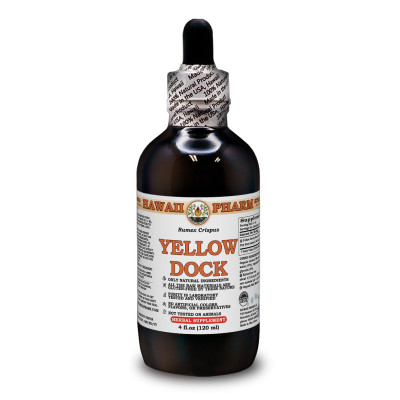
Our Amazon links to powerful cures like Hawaii Pharm herbal tinctures often disappear mysteriously after we publish. Support our outside vendors by purchasing Yellow Dock Root (Rumex crispus) tincture here.
Other Treatments for Anemia During Pregnancy
There are actually a lot of potential treatment options for pregnancy-related anemia, even beyond those discussed in more detail above. Below, we’ve listed some other scientifically proven anemia treatments that are safe to use during pregnancy:- Cilantro / Coriander (Coriandrum sativum) - This is an iron-rich herb
- Chives (Allium schoenoprasum) - This is an iron-rich herb
- Vitamin C supplements - We’ve already talked a bit about this, but taking a minimum of 3000-4000mg of vitamin C each day can be a huge help in building enough blood during pregnancy.
- Chlorophyll supplements
- Black sesame seeds - These are rich in iron, folate, vitamin B6, zinc, copper, selenium, and vitamin E. The freshly ground powder can be taken at a dose of 1 teaspoon per day with honey, or you can take them as a supplement.
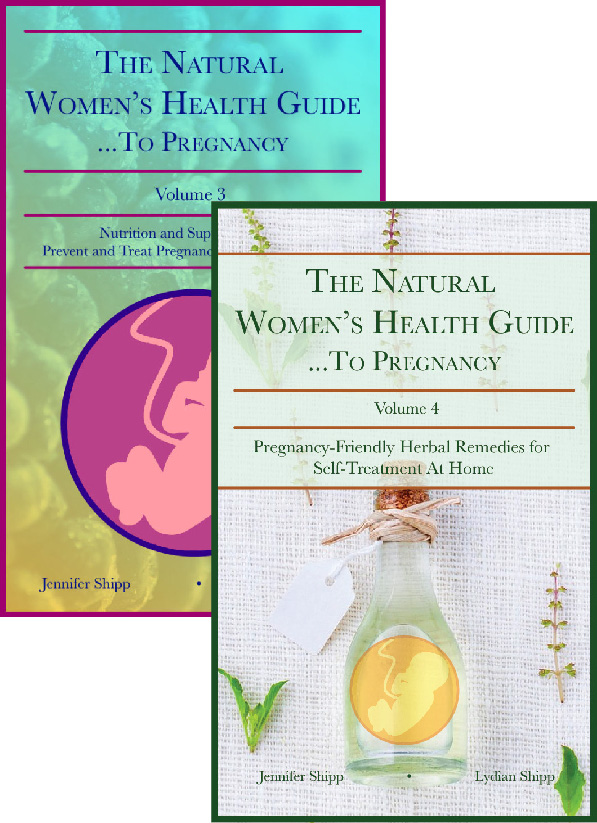
"The Natural Women's Health Guide... to Pregnancy - BUY HERE!"
 Click here to subscribe to the Living Database!
Click here to subscribe to the Living Database!
Related Posts: https://alivenhealthy.com/2023/03/19/pregnancy-superfoods-food-to-eat-during-pregnancy/ https://alivenhealthy.com/2023/02/03/how-to-use-magnesium-to-prevent-preeclampsia-during-pregnancy/ https://alivenhealthy.com/2023/02/02/vitamin-d-pregnancy-and-the-little-white-nutrition-lies-that-can-hurt-you-and-your-baby/ https://alivenhealthy.com/2022/05/28/how-to-use-vitamin-c-during-pregnancy-for-a-safer-birth-a-healthy-baby-and-a-happy-mom/ https://alivenhealthy.com/2022/06/08/is-morning-sickness-caused-by-gallstones-the-gallbladders-role-during-pregnancy/ https://alivenhealthy.com/2023/02/27/how-to-treat-a-uti-while-pregnant-home-remedy-for-uti-during-pregnancy/ https://alivenhealthy.com/2023/02/24/natural-ways-to-stop-vaginal-bleeding-during-pregnancy-to-prevent-miscarriage-naturally/ https://alivenhealthy.com/2022/10/13/herbs-that-cause-abortion-herbs-to-avoid-during-pregnancy/
Resources:

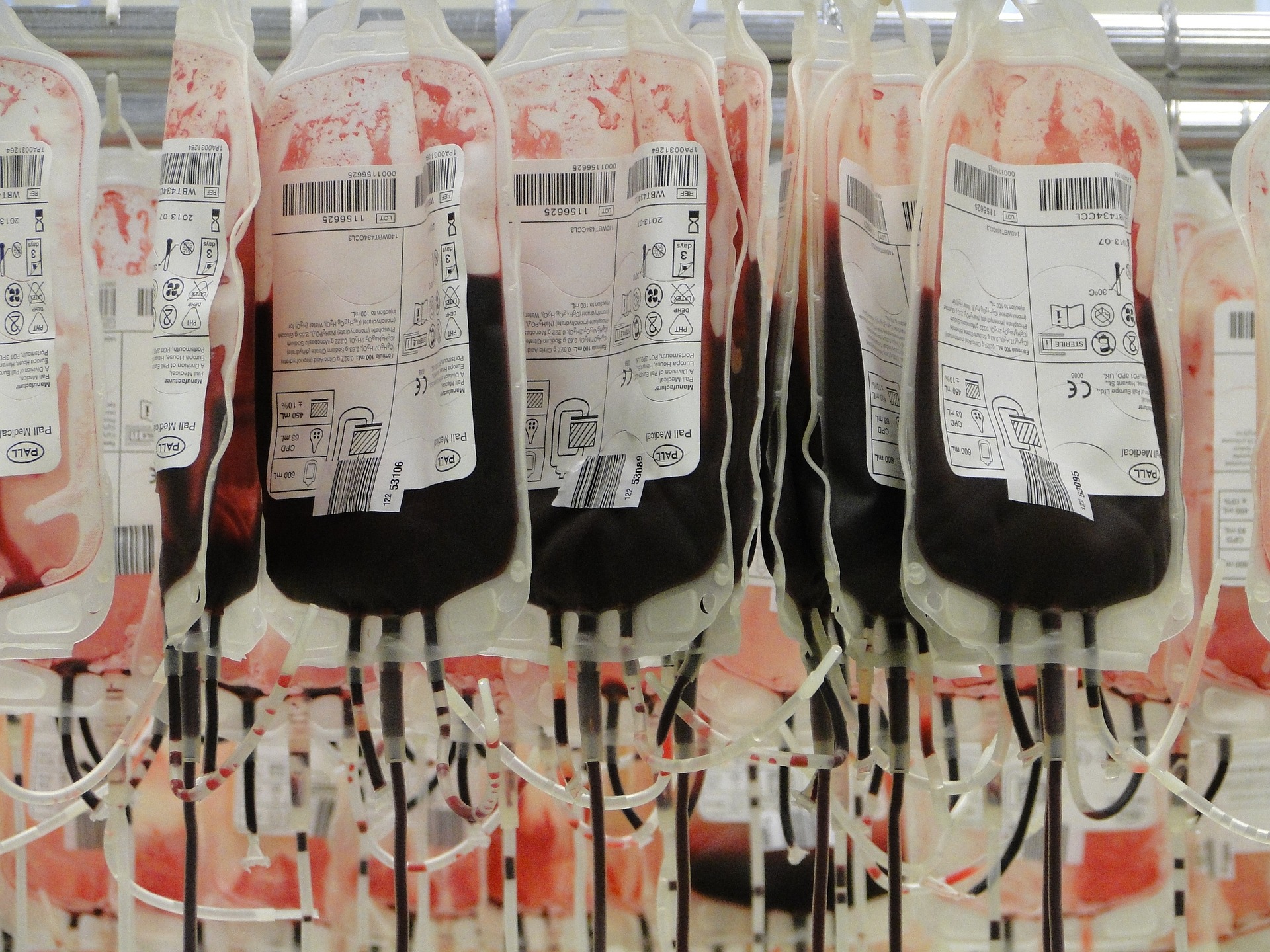 Blood transfusion is a common treatment for anemia. While this treatment does indeed work quickly, it doesn't necessarily treat the root cause of the problem, so the anemia can still develop again in the future.
Blood transfusion is a common treatment for anemia. While this treatment does indeed work quickly, it doesn't necessarily treat the root cause of the problem, so the anemia can still develop again in the future.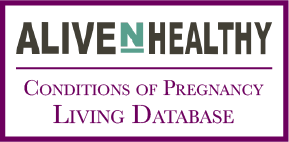 The Conditions of Pregnancy Living Database, BETA Release - NOW AVAILABLE! Click here to learn more...
The Conditions of Pregnancy Living Database, BETA Release - NOW AVAILABLE! Click here to learn more...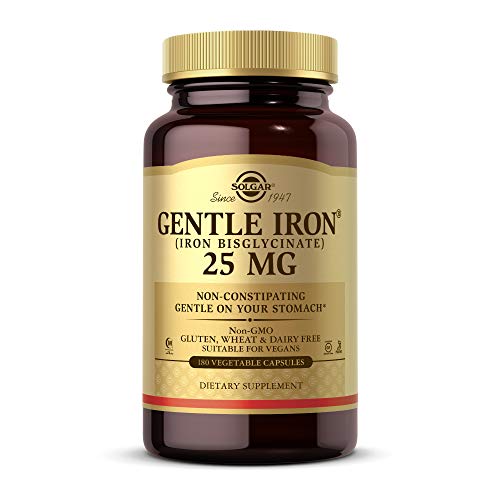 Solgar Gentle Iron (Iron Bisglycinate) 25 mg - 180 Vegetable Capsules - Non-Constipating, Gentle on Your Stomach - Non-GMO, Gluten Free - 180 Servings
Solgar Gentle Iron (Iron Bisglycinate) 25 mg - 180 Vegetable Capsules - Non-Constipating, Gentle on Your Stomach - Non-GMO, Gluten Free - 180 Servings
 Vegan Vitamin B12 Sublingual Liquid Drops by Live Conscious- Methylcobalamin Max Strength B12 5000mcg Formula - Vegan B 12 Vitamin Support Energy & Mood, Promote Memory, Aid Immune System - 60 Serving
Vegan Vitamin B12 Sublingual Liquid Drops by Live Conscious- Methylcobalamin Max Strength B12 5000mcg Formula - Vegan B 12 Vitamin Support Energy & Mood, Promote Memory, Aid Immune System - 60 Serving
 L Methylfolate 1000mcg | 200 Capsules | Value Size | Optimized and Activated | Non-GMO, Gluten Free | Methyl Folate, 5-MTHF | by Opti-Folate
L Methylfolate 1000mcg | 200 Capsules | Value Size | Optimized and Activated | Non-GMO, Gluten Free | Methyl Folate, 5-MTHF | by Opti-Folate
 PURA VIDA MORINGA Moringa Powder Organic Single Origin - Premium 100% Leaf Powder, USDA Organic Moringa Oleifera, Moringa Leaf Powder - Perfect for Smoothies & Recipes. 8 oz.
PURA VIDA MORINGA Moringa Powder Organic Single Origin - Premium 100% Leaf Powder, USDA Organic Moringa Oleifera, Moringa Leaf Powder - Perfect for Smoothies & Recipes. 8 oz.
 Bragg Organic Apple Cider Vinegar With the Mother– USDA Certified Organic – Raw, Unfiltered All Natural Ingredients, 16 ounce, 2 Pack
Bragg Organic Apple Cider Vinegar With the Mother– USDA Certified Organic – Raw, Unfiltered All Natural Ingredients, 16 ounce, 2 Pack
 Traditional Medicinals Tea, Organic Raspberry Leaf, Eases Menstrual Cramps, Supports a Healthy Pregnancy, 96 Tea Bags (6 Pack)
Traditional Medicinals Tea, Organic Raspberry Leaf, Eases Menstrual Cramps, Supports a Healthy Pregnancy, 96 Tea Bags (6 Pack)
 Traditional Medicinals Tea, Organic Roasted Dandelion Root, Supports Kidney Function & Healthy Digestion,16 Count(Pack of 6)
Traditional Medicinals Tea, Organic Roasted Dandelion Root, Supports Kidney Function & Healthy Digestion,16 Count(Pack of 6)














